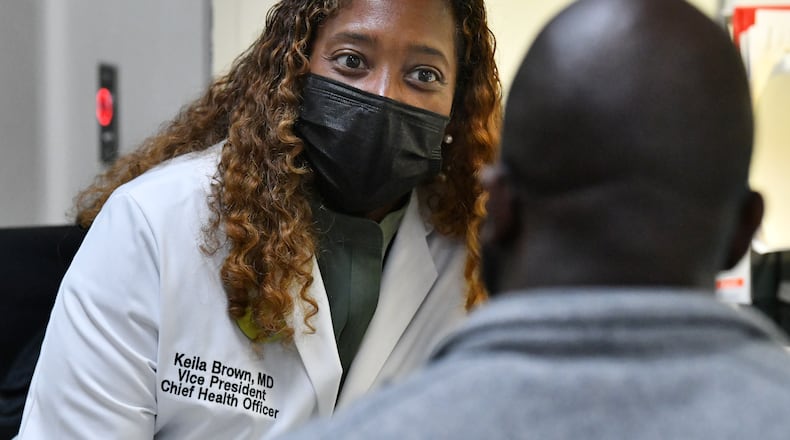The loss of hospital services at Atlanta Medical Center’s two locations in downtown and East Point is the subject of plans and discussion for both Atlanta and Fulton County elected officials. But while elected leaders are pushing for new clinics and health facilities, existing clinics say they already offer care to the poor and uninsured.
Craig Tindall, chief executive officer of Whitefoord Inc., a provider of charitable care in Atlanta, said leaders of clinics that provide charitable care have raised their hands to help make up for the loss of services.
Whitefoord is one of several federally qualified health centers (FQHC) located in Fulton. These federally funded non-profit health centers treat medically underserved communities.
“It was kind of a revelation and news to the acute care hospitals that FQHCs had capacity to assist in this challenge,” Tindall said. “And that’s still the case.”
County commissioners are drafting an agreement with Morehouse School of Medicine to open a new clinic in south Fulton County, near where Atlanta Medical Center South hospital was replaced with an out-patient clinic: Wellstar East Point Health Center. According to commission discussions in April, the proposed Morehouse clinic would bring primary care doctors and other specialists to the area.
A Morehouse and Ernst and Young report completed last month found that residents of south Fulton County have the lowest access to health care out of all of the county’s residents and lack health care facilities and providers for primary and specialty care needs. Fulton’s non-profit health centers say they can be part of the solution.
“I think that FQHCs need to have a larger voice and also be seen as subject matter experts in the health care realm,” said Louis Simmons, chief operating officer of Whitefoord Inc. ”I think there’s a void. There’s another area within the health care field that really has been untapped.”
“The safety net of the safety net”
Federally Qualified Health Centers (FQHCs) are health care organizations that see all patients regardless of insurance status. In the United States there are 1,403 funded by the Health Resources Service Administration, with 34 here in Georgia. According to the Georgia Primary Care Association, there are six of these health centers south of I-20. They offer medical, dental and behavioral and mental health services to patients on a sliding fee scale basis, based on their ability to pay.
Donna Looper, executive director of the Georgia Charitable Care Network, the state organization for providers of charitable care, said that Georgia has more FQHCs than any other state in the country with the exception of Florida.
“They’re all very unique to the communities that they serve and they fill gaps in those communities,” Looper explained. Primarily, these clinics are primary care providers. Their goal is to keep the [patient] population out of the emergency room.”
In 2022, Wellstar Health System permanently closed AMC and turned AMC South into an urgent care clinic, saying both hospitals were losing money. Both served many low-income residents of color without insurance.
Adding to the need for affordable care, an estimated 240,000 to 560,000 Georgians are expected to be dropped from Medicaid over the next year due to the end of pandemic protections. Every one of Georgia’s 2.8 million enrollees in Medicaid — federal health insurance for the poor — will be re-evaluated to confirm they still qualify.
Looper said existing non-profit clinics are already seeing more patients. “I know there’s an uptick and it’s going to continue to grow because of Medicaid unwinding.”
All of the clinics within the Georgia Charitable Care Network are independently run charities, also know as 501(c)(3)s, that raise their own money to operate each year and receive state grant money through the network.
“They do a remarkable job. They’re kind of a well-kept secret of the safety net,” Looper said. " They’re the safety net of the safety net.”
An ‘ecosystem’ of care
The Family Center at West End is a charitable clinic southwest of downtown that provides many primary health care services that some former AMC patients went to the emergency room to receive.
“As long as there are patients who continue to have some health inequities due to their ability to pay, places like community health centers are always going to be of value because we serve that particular population,” said Dr. Keila Brown, vice president of The Family Center at West End. ”I think some patients don’t realize the work that we do and that we (can) offset some of the issues as to why they have not been able to seek health care in the first place.”
One challenge that Brown says the clinic has been facing is the ability to access specialty services that aren’t offered at the West End clinic. Since the AMC hospital closures, she said travel distances for services have increased along with wait times.
Brown said her patients used to have to wait five to seven days for mammogram screenings when Atlanta Medical Center was open. Now, wait times are two to three months at places like Emory University Midtown Hospital.
The Center for Black Women’s Wellness provides charitable care for underserved Black women and their families. Jemea Dorsey, chief executive officer, said hospitals and other larger medical providers do not always partner with clinics like hers to serve patients. “I think even in places like Atlanta, an urban area, there’s still fragmentation. Health care systems are often siloed.”
“There’s an entire ecosystem out there,” Dorsey said. “I think there just needs to be more awareness of that ecosystem of health care providers.”
Credit: HYOSUB SHIN / AJC
Credit: HYOSUB SHIN / AJC
‘We’re here’
It could be October before the public will find out what will become of the former AMC site downtown in the Old Fourth Ward neighborhood. City officials seem adamant about using at least a portion of the site for health care services, however.
“We’re still working on trying to find the occupant for the space to make sure that we can get medical attention to the Atlanta community that needs it,” Dickens told The Atlanta Journal-Constitution in late April. “And so we’re still talking to operators of hospitals, and working with the county and with some of the local providers to be able to bring about an opportunity for us to come back with something that’s a hospital there.”
To the south, questions have been raised on the County Commission about the proposed Morehouse-operated clinic duplicating already available services in the area. The two clinics near the former AMC location are both small and while they can provide some care more choices are needed, local providers and elected officials say.
“I know that there are organizations out there, it’s just sometimes I feel like I don’t know what all is out there,” said Susan Whatley, executive director and founder of The Urban Clinic. “If I feel like that, I know the patients feel like that. It’s just hard to navigate.”
The Urban Clinic, a free clinic located on Cleveland Avenue in East Point, is unique in the area because it does not bill any of its patients, all of whom have Medicaid or are uninsured. While they are not considered an FQHC, they partner with FQHCs for services they can’t provide.
Overall, charitable care providers want people to know that they are an available option within Atlanta’s health care landscape.
“The most important thing is that people need options even if people do not have insurance. It’s this notion of choice,” Dorsey said. “That’s one of the other frustrating points when a big system closes. We remove choice from people.”
About the Author
The Latest
Featured



